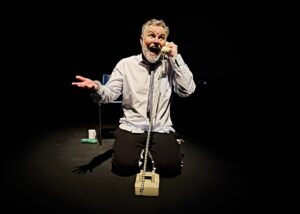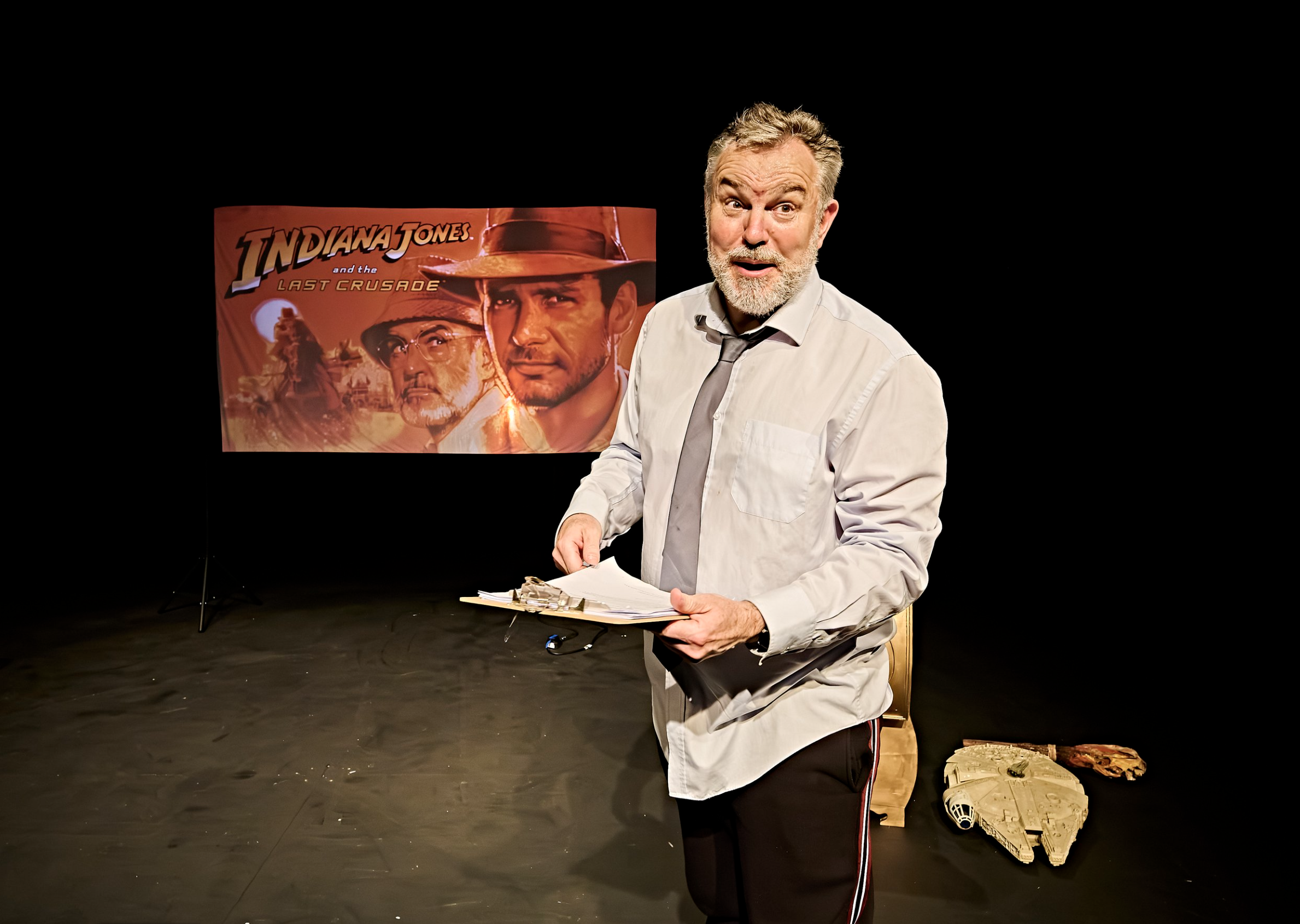‘Martin Decker: DAD’ is the culmination of a story five years in the making – a journey that’s stretched from lockdown shorts to a festival-touring feature film, and now, the character has been brought back to where it should have all begun: the stage.
That Decker’s theatrical debut was originally derailed by COVID gives this return an added poignancy. And while this might not be his final act, it feels like a breakthrough – a moment of closure, with the character coming full circle.
The conceit of the show is that Martin Decker is touring his own lecture series on fatherhood, and I had expected the character to largely remain within the boundaries of this TED Talk parody. Of course, narrative detours were inevitable – Decker’s constructed persona has always cracked, allowing room for both humour and glimpses of something darker beneath the surface – but the show was an unexpectedly full-blooded theatrical experience. Less spoof and more dramatic monologue, it blends comic flourishes with an intricate character study.
For those unfamiliar with Decker, he is introduced afresh as a minor YouTube personality with no less than 1.77k subscribers and no shortage of self-belief. It’s clear from the outset that he’s desperate to assert his relevance, but this isn’t purely about ego. He’s seeking connection – constantly referencing his son, somewhere out in the audience. This is all for him.
His theory? That fathers can be understood primarily via the films of Harrison Ford. Through Star Wars, Indiana Jones and Witness, we piece together both Martin’s view of fatherhood and his own life story. From childhood abandonment to a romanticised version of his absent father – and his turbulent relationship with his own son – we watch as he reaches a painful realisation: real life rarely mirrors the story arcs of his Hollywood hero.

Keiron Self as Martin Decker
Keiron Self is sensational as Decker. His comic instincts are impressive, but it’s his emotional precision that truly stuns. In one particular moment – when Decker discovers his wife is pregnant – Self’s eyes fill with tears at astonishing speed, capturing a flash of pure, unfiltered joy. Elsewhere, in imagined phone calls with his father (Decker casts him as a rakish adventurer who has left for globe-trotting thrills) Self uses this comedy to mask the pain, but by the time we reach The Last Crusade, with Sean Connery’s redemptive line, “I thought I lost you, boy”, Self ensures that we see this fantasy unravel.
The supporting cast – appearing via cleverly integrated video clips – elevate the show’s comedic moments. Elin Phillips has wonderful comic timing, François Pandolfo’s deadpan Kylo Ren is hysterical, and Kev McCurdy’s Sean Connery impression is a show-stealer. The re-enactments of the Star Wars and Indy scenes are brilliantly observed, complete with painstaking shot recreations and charming stop-motion paper mâché animation.
The set is minimal – just a projector and a few toys – suggesting everything’s been hauled in from Decker’s car boot. That lo-fi aesthetic feels perfectly in tune with the character and his world. Josh Bowles’s exquisite sound design also adds emotional texture, underscoring the increasing unravelling of Martin.
The script, written by Self with Kevin Jones, is ambitious and unafraid with its comedy, and laced with thoughtful reflections on male mental health, generational trauma and domestic abuse. The use of Harrison Ford never feels like a gimmick. All of the films are cleverly woven through Decker’s memories, most effectively with Kingdom of the Crystal Skull – released the year Decker’s son is born – acting as a metaphor for his inability to recapture the magic of youth.
That said, the show’s tonal shifts can occasionally be jarring. The jumps between the faux-lecture framework and full dramatic monologue sometimes stretch credibility. It can be hard to accept that this is all still happening within the reality of a live event. Perhaps the story might have been better served by framing it entirely as a monologue from the outset. Still, the theatricality is bold and the message lands.
‘Martin Decker: DAD’ is ultimately about persistence – about what happens when you keep going, even when everyone tells you to stop. Decker can be foolish, even embarrassing, but his inability to switch off the light inside him is inspiring. He may sway from the path or doubt himself, but he never listens to the naysayers or sinks to the level of his abusive father. His problems aren’t neatly resolved – they’re too deep-rooted for that – but there’s something movingly triumphant in the conclusion he reaches.
There’s certainly room for more Martin Decker, in whatever form Self and Jones choose to explore next. But if this really is the end, ‘Martin Decker: DAD’ is a fitting finale for a character whose creators have proved is as comedically sharp as he is emotionally raw.
Touring to Torch Theatre, Milford Haven (Wed 25 June), Maesteg Town Hall (Thurs 26 June) and The Welfare, Ystradgynlais (Fri 27 June).


